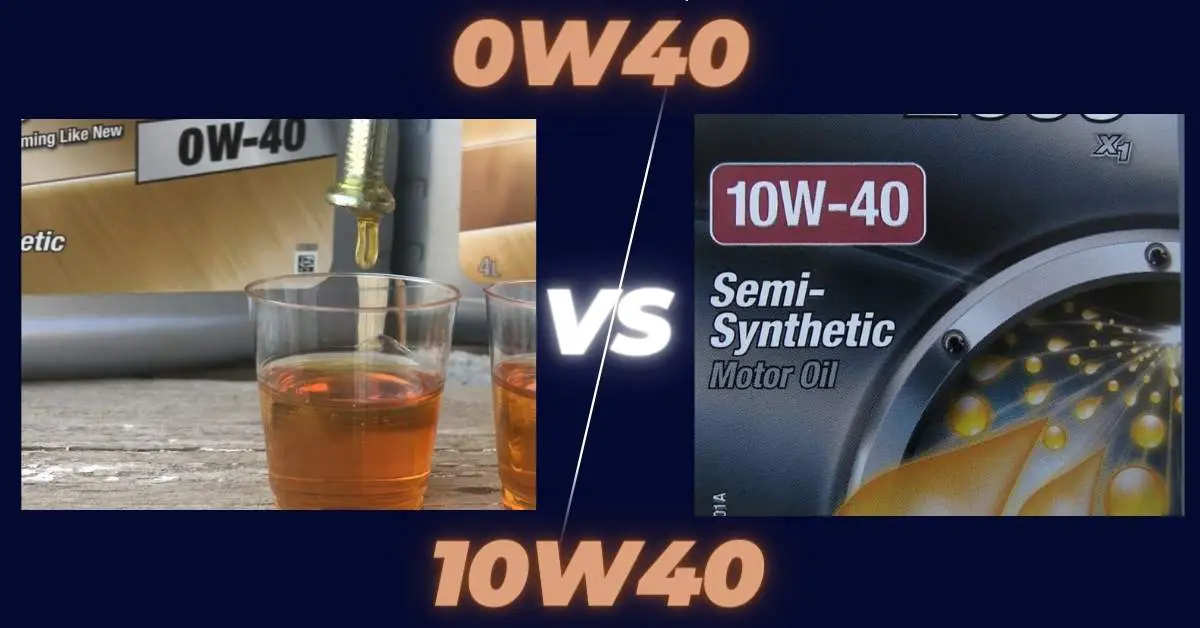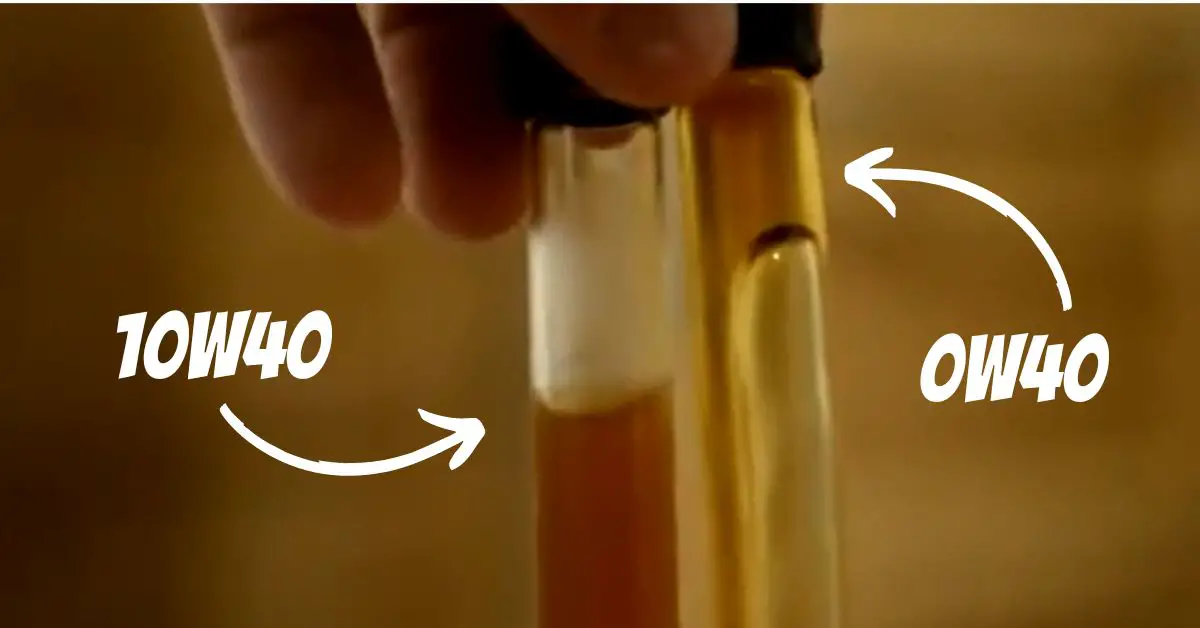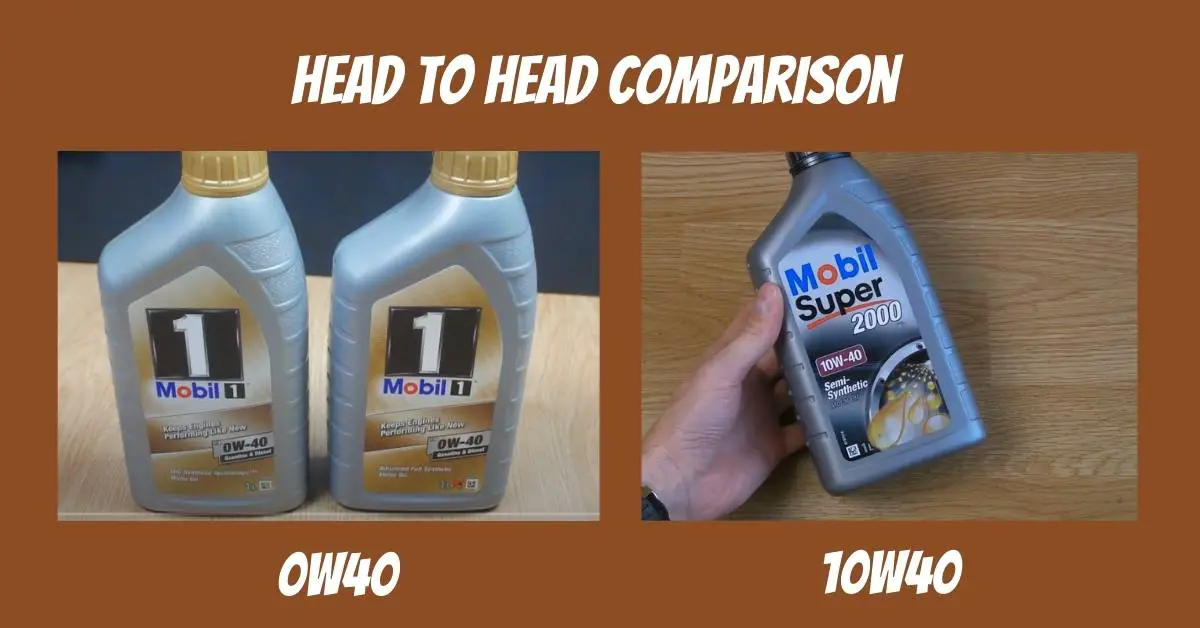Oil is an essential component of your engine. It works as a lubricant and prevents your engine from wearing out. So, it’s very important to use the right oil for the right application.
So, which engine oil is objectively better, 0W40 vs 10W40?

A thinner oil like 0W40 is better because it can reach engine components faster even in winter. 10W40 is better in the case of oil consumption. However, you should always use the recommended oil from your car manual at all times.
However, there are many other determiners besides these. That’s why we’ve tried our best to compare them step by step.
So, let’s not waste any more time and jump right in –
0W40 vs 10W40: Understanding the Oil Code and Viscosity

First, we need to understand what 0W-40 and 10W-40 stand for and what they mean. Knowing this will make this comparison significantly easier for you.
Unfortunately, this comparison requires a little bit of science to understand it. However, no need to be stressed! We will keep it easy and informative for you.
What is Viscosity?
In easy words, viscosity means the thickness of a liquid. For example, honey is thicker than water and thus it has a high viscosity rating.
So, a fluid with higher viscosity can resist motion more than a lesser one. Therefore, more viscosity means lesser flow. For instance, it’s much harder to move your finger through honey.
At the same time, honey will travel much slower than water due to being thick. Simply put, fluid will flow faster if it’s thinner.
Explanation of The Oil Code
Now that we have a basic idea about viscosity, it’s time to go deeper. Every multigrade oil has a viscosity rating and SAE grades.
Let’s take 0W-40 for an example. As you can see, it has two numbers and one of them has a W attached. Both of them are viscosity ratings.
By now you might ask, why are there two numbers instead of one? Also, why is there a W in the code? Well, the W stands for winter. It also means the base viscosity as well.
So, the other number indicates the viscosity in 100 degrees celsius which is engine temperature. These numbers are called SAE grades.
Since there are two different grades for the same oil, it is called multigrade oil.
By now you might ask, does the oil become thicker as the temperature rises? Well, not exactly.
The 0W in 0W-40 represents the base viscosity. 0W means the fluid is extremely high-flowing when the temperature is low (-10C to -40C).
However, the oil can behave like a thicker grade oil (SAE 40) when the temperature reaches 100C.
So, for example, a 5W-40 will be thinner than a 10W-30 in low temperatures. But when the engine reaches the operating temperature (100C), 10W30 oil will be much thinner.
Since we are talking about oils, here are some of our best picks –
These will help you a lot and now you can get them whenever you want.
0W40 vs 10W40: Head to Head Comparison

Now that our background study is done, we can begin a proper comparison. To make it easy, we have prepared a small table for you –
| Attributes | 0W-40 | 10W-40 |
|---|---|---|
| Viscosity (Low Temp) | Thinner | Thicker |
| Viscosity (High Temp) | Same | Same |
| Efficiency (Under 100C) | Higher | Lower |
| Efficiency (100C - 150C) | Similar | Similar |
| Oil Consumption | More | Less |
These can help you identify which oil is the one for you. But learn more about these two oils in detail!
Oil Consumption
It’s been a concern for most auto-enthusiasts that 0W-40 causes consumption to go up. This is mostly because thinner oil is usually used by an engine more.
So, 10W-40 can be a more efficient option, both cost, and engine-wise.
Efficiency Of Engine
Higher performance engines may see higher loads in engine parts. This requires thicker viscosity oil such as 10W-40. Using thinner oil in those engines won’t be a good idea.
Due to 0W-40 being thinner, it has a slightly higher efficiency in certain engines.
So, try to use the oil that is recommended in your car manual.
Usage in Certain Temperatures
As we have already discussed, 0W-40 will be much better than 10W-40 in cold temperatures. So, if you’re living in Canada or other snowy countries, 0W-40 is going to be objectively better.
However, in warm places, you won’t see any difference. Since both oils have the same viscosity grade at higher temperatures, they will perform the same.
But between both oils, the 0W-40 is superior.
Choosing the Best Oil For You: 0W-40 or 10W-40
We’re going to say it again, use the oil that is recommended in your car manual.
However, if you really want to use different oils, there are some rules to maintain.
For example, if you’re already using 10W-40 oil, 15W-40 will be super bad for you. Similarly, 5W40 will be an upgrade but 5W-30 won’t.
Simply put, going lower on operating viscosity will be objectively bad for your car. Also, going higher from 0w40 may severely damage your engine during winter.
Frequently Asked Questions
Q: What is 0W40 oil used for?
Ans: Because of its lower viscosity, many European and American automobiles are using it in their cars. Companies like Mercedes-Benzs and Porsche use this oil for high performance.
Q: Can I use 0W40 instead of 5W40?
Ans: Yes. Because of having the same viscosity in operating temperature, they won’t make a difference at all. However, 0W-40 will perform better and will be more beneficial in cold weather.
Q: Can you mix 0W40 with 10W40?
Ans: Yes, you can! But you need some expertise on it.
Conclusion
So, that’s all we could manage regarding 0W40 vs 10W40. We hope the comparison helped you, even if it’s a little bit.
So, have you decided which oil you are going to use?
Also, if you have something to add, don’t hesitate to use the comment section below.
Last but not least, good luck!
- Ford Fusion Hybrid Battery Dead (Things to Understand) - September 17, 2022
- EcoBoost Noise When Accelerating (problems+Solutions) - September 17, 2022
- Ford Fusion Power Seat Problems (Here The Solutions) - September 17, 2022

Can i use 5w-40 instade of 10w-40?
So, thanks for the insight. I have a SL500 Mercedes that holds 8 Qts. I have both Mobile 0w-40 and Mobile 10w-40 oils. I would like to get rid of the 3 qts of 10w-40 and use only 0w-40. can I mix in these last 3 qts over the next 3 oil changes and not cause and issues. Thanks